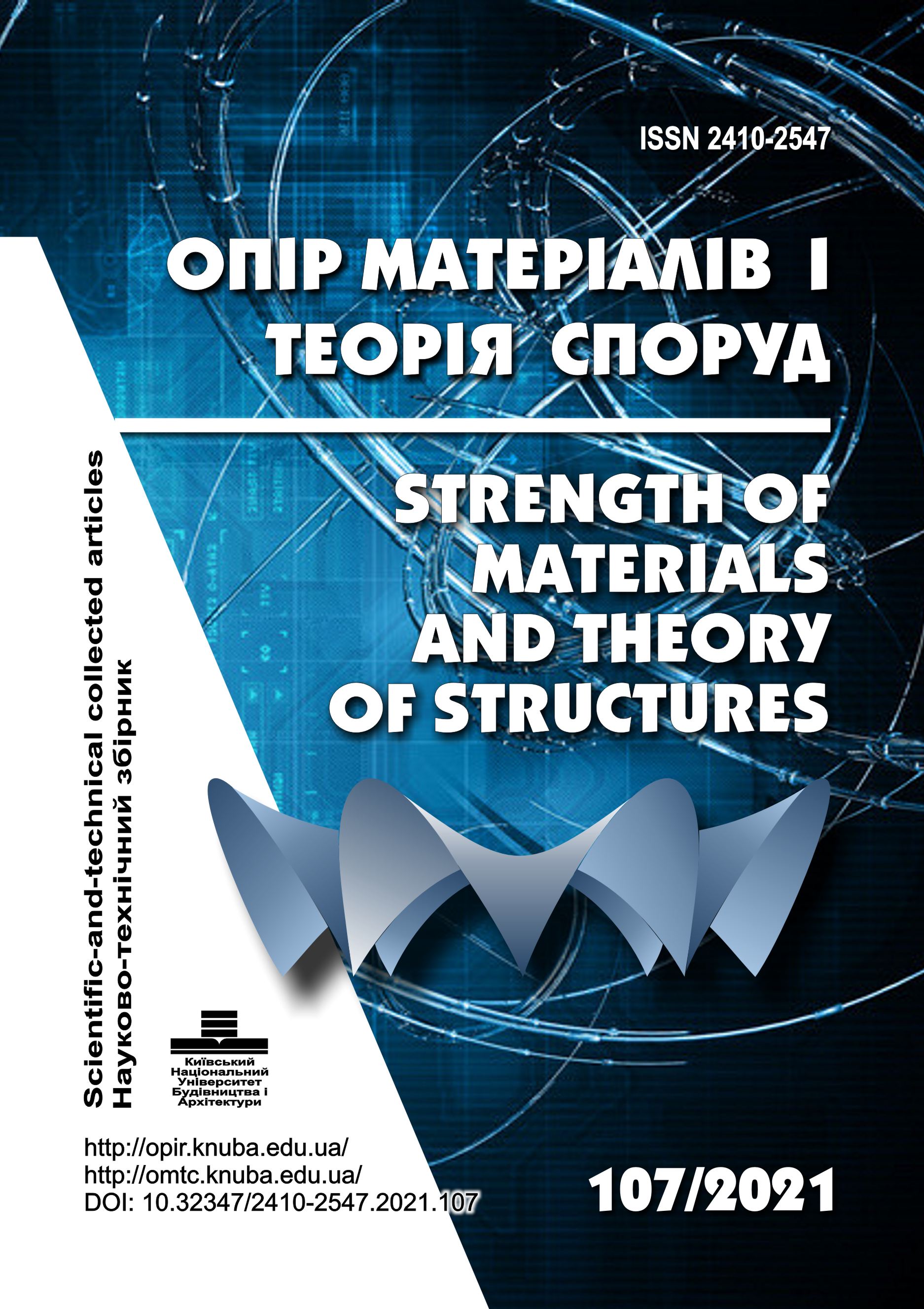The Effect Of The Actual Stiffness Of Bolted Hinged Joints On The Bearing Capacity Of The Elements
DOI:
https://doi.org/10.32347/2410-2547.2021.107.323-332Keywords:
bolt, connection, bearing capacity, resistance, rigidity, hinge joint, beamAbstract
The article investigates the influence of partial stiffness of the hinge joint of single-span and multi-span freely supported beams with lower structures on their stress-strain state under the action of vertical evenly distributed load. Joints of freely supported beams under the action of external load are opened on supports and mounting bolts interfere with their full opening, that is joints work as partially rigid. Knowing some initial parameters of ideally hinged joints, it is possible to establish what influence their change will have both on the calculation scheme of beams, and on calculation schemes of cross frames of frameworks of buildings and constructions, to which they enter, as a whole. The method of initial parameters was used to determine the influence of the resistance of the mounting bolts on the opening of the support joints on the stress state of the elements. The offered technique allows to define real rigidity of any bolted hinge connection taking into account its actual work and to adjust it stiffness by changing the diameter of the bolts, the strength of the material from which they are made, their number, distance between them, as well as use additional material resource by reducing the maximum stresses in the calculated cross sections. This is especially true of elements made of perforated profiles, because the change of stress-strain state in the support zones will cause redistribution of stresses in the calculated points of their cross sections, both on the supports and in the span of the beams. This must be taken into account by including certain coefficients in the calculation formulas, depending on the specific operating conditions.
References
Stalevi konstruktsiyi (Steel structures). DBN V.2.6 – 198: 2014. .(in Ukrainian)
Eurocode 3: Design of steel structures. EN 1993-1-8:2005.
V. Romanіuk, V. Suprunіuk. Mitsnist ta deformatyvnist perforovanykh elementiv stalevoyi arky (Strength and deformability of perforated elements of steel arch). Monohrafiya. Rivne, NUVHP, 2013. (in Ukrainian)
V. Romanіuk, V. Suprunіuk. Osoblyvosti rozrakhunku prolotnykh konstruktsiy z perforovanykh elementiv za skladnoho napruzheno-deformovanoho stanu (Features of the calculation of span structures from perforated elements in complex stress-strain state). Zbirnyk naukovykh prats Ukrayinskoho derzhavnoho universytetu zaliznychnoho transportu. Kharkiv, UkrDUZT, 2018. Vypusk 175. – P. 98 – 108. (in Ukrainian)
V. Romanіuk, V. Suprunіuk. Eksperymentalni doslidzhennya prolotnykh konstruktsiy z perforovanykh elementiv za skladnoho napruzheno-deformovanoho stanu (Experimental researches of of flexible constructions from perforated elements at a complex stress-deformed state). Opir materialiv i teoriya sporud: nauk. –tekh zbirn. K: KNUBA, 2019. Vyp. 103. Pages 189–300. .(in Ukrainian)
Xue-Chun Liu, Fu-Yuan Cui, Zi-Qin Jiang, Xiao-Qing Wang. Tension–bend–shear capacity of bolted-flange connection for square steel tube column. Engineering Structures, Volume 20115, December 2019, Article 109798.
Farshad Hashemi Rezvani, Hamid Ronagh. Span length effect on alternate load path capacity of welded unreinforced flange-bolted web connections. Journal of Constructional Steel Research, Volume 138, November 2017. Pages 714–728.
Jia Wang, Brian Uy, Huu-Tai Thai, Dongxu Li. Behaviour and design of demountable beam-to-column composite bolted joints with extended end-plates. Journal of Constructional Steel Research, Volume 144, May 2018. Pages 221–235.
I. Shardakov, A. Shestakov, M. Son, A. Zemlanuhin, I. Glot. Beam to column flange connection: from elasticity to destruction (theory and experiment). Procedia Structural Integrity. Volume 132018. Pages 1324–1329.
I. Shardakov, A. Shestakov, I. Glot. Experimental and Theoretical Study of Deformation Processes in a Flange Connection of Iron Beams. Procedia Structural Integrity. Volume 92018. Pages 207–214.
V. Romaniuk, V. Supruniuk. Influence of Flexibility of Bolted Joints on Rigity of the Hingeless Frame. Springer Nature Switzerland AG 2021: EcoComfort 2020, LNCE 100, Pages 371–377, 2021. https://doi.org/10.1007/978-3-030-57340-9_45.
Downloads
Published
Issue
Section
License
Copyright (c) 2022 Володимир Романюк, Володимир Супрунюк, Леонід Безнюк, Тарас Місюк

This work is licensed under a Creative Commons Attribution 4.0 International License.
Authors retain copyright and grant the journal right of first publication with the work simultaneously licensed under a Creative Commons Attribution License that allows others to share the work with an acknowledgement of the work's authorship and initial publication in this journal.

